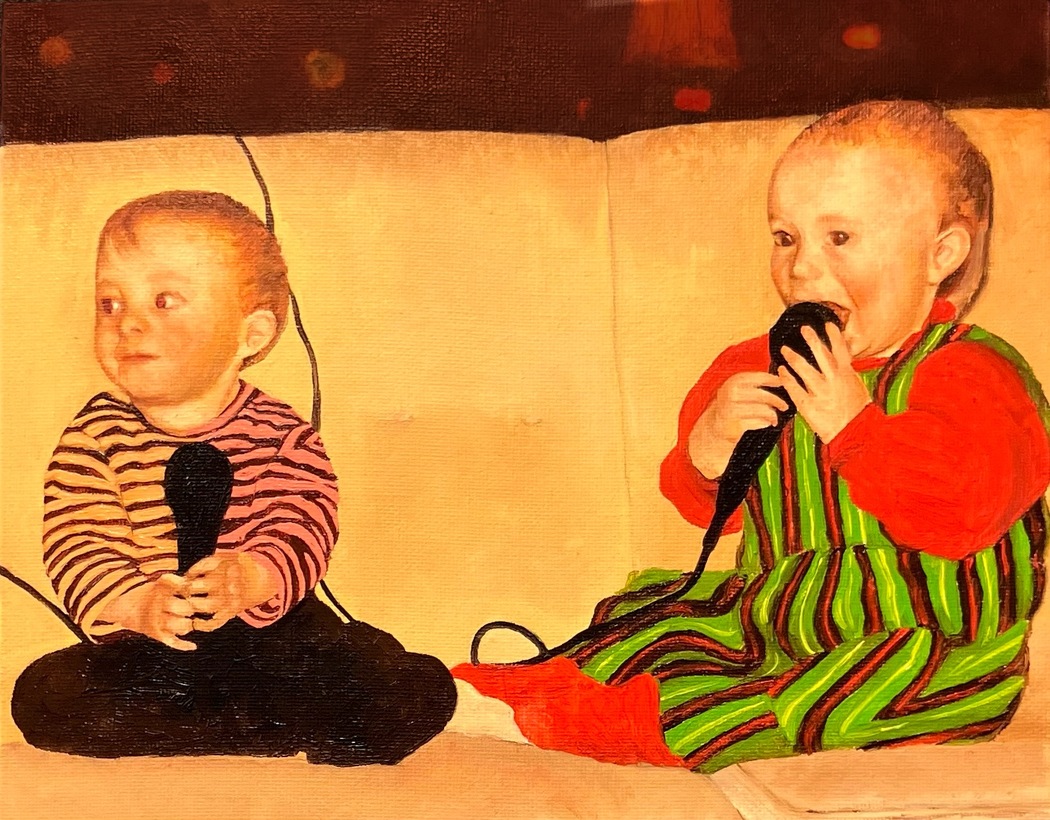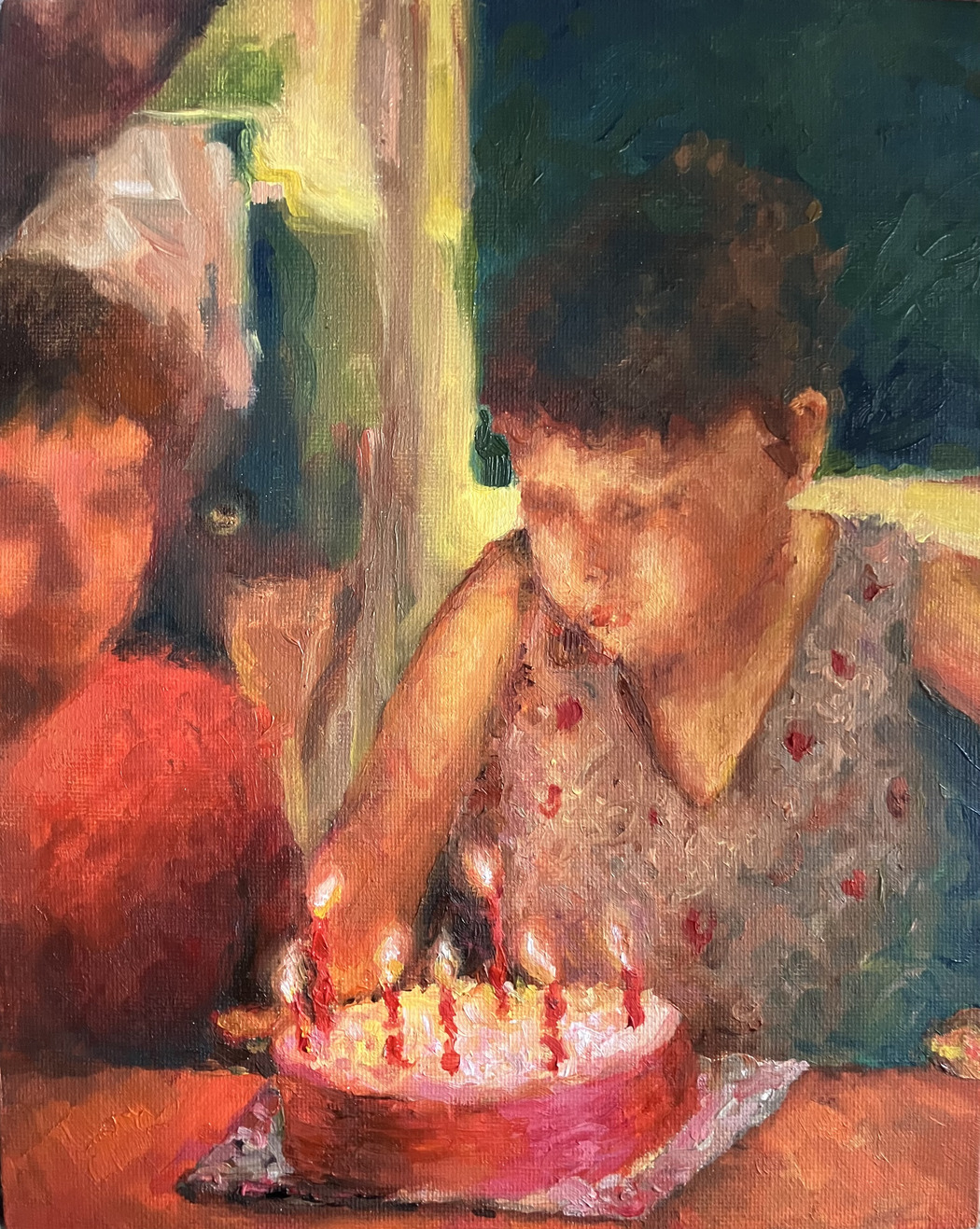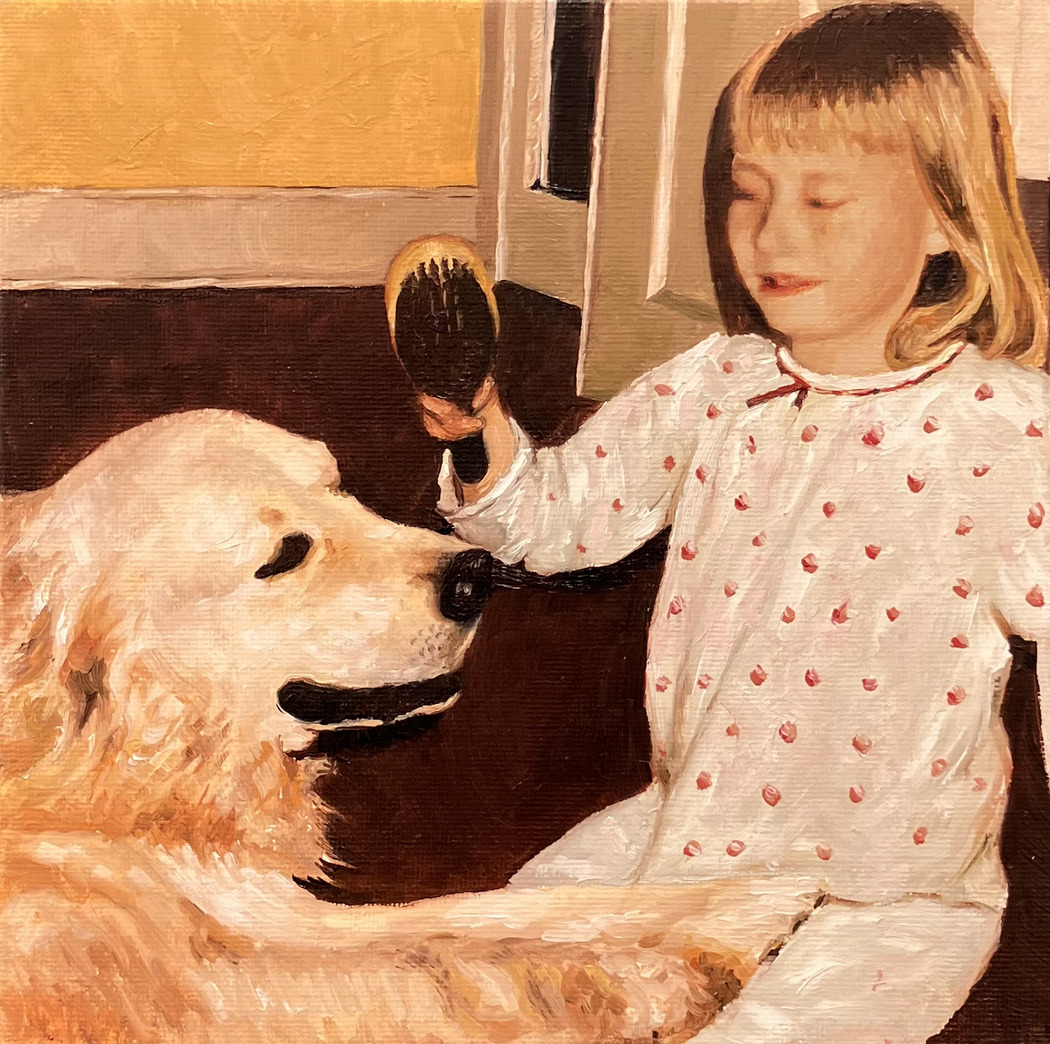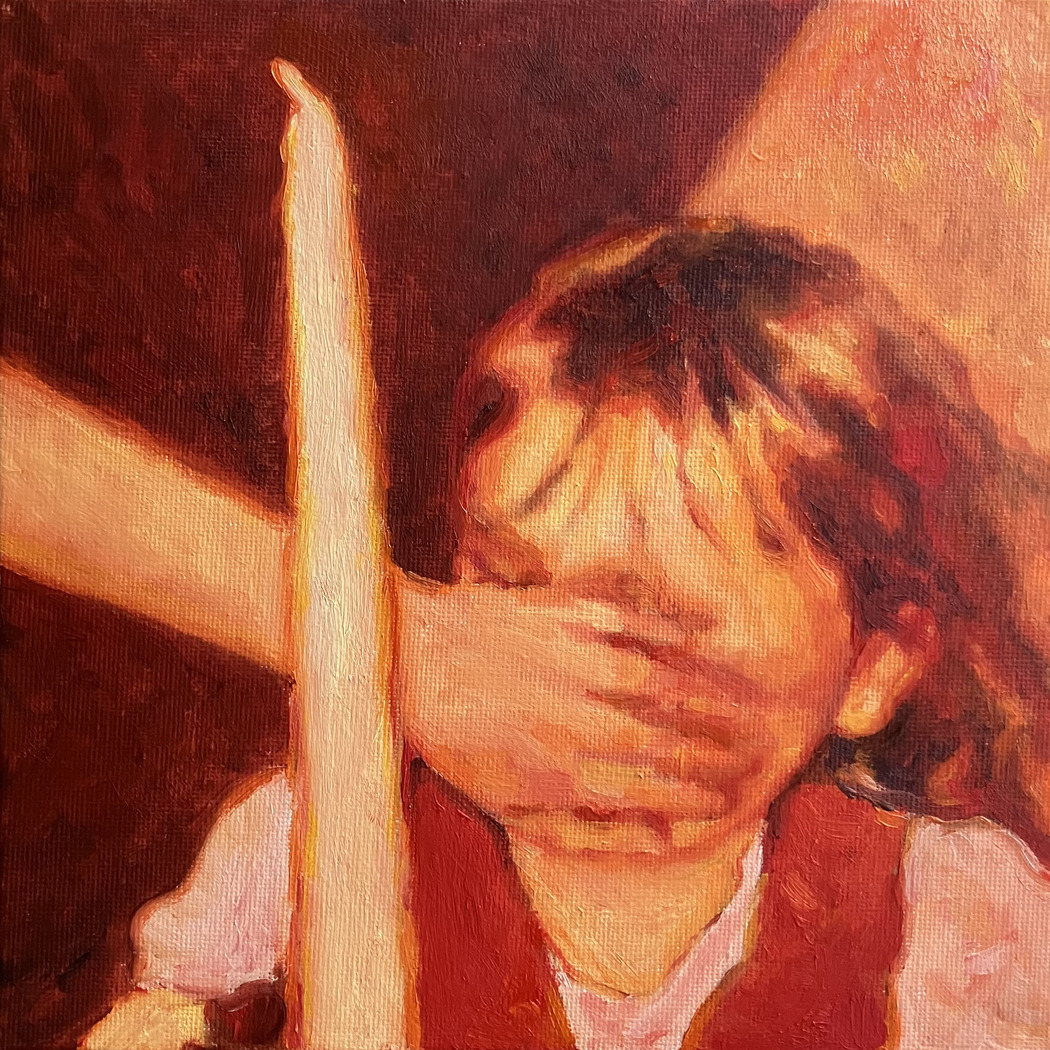Olivia Ross
 Olivia Ross | Our First Karaoke | 2025
Olivia Ross | Our First Karaoke | 2025
To begin with, could you tell us what first drew you to painting as a form of expression?
My journey into painting began during the COVID-19 lockdown. I was 24 at the time and on furlough from my job, which eventually led to redundancy. I was searching for a fulfilling hobby to pass the time and decided to paint a self-portrait using some of my mum’s old acrylic paints from when she used to do art classes with her friends. I hadn’t painted since primary school, so I was really surprised by how much I enjoyed the process and by how much I loved the painting I produced. It felt like the first time since the start of the pandemic that my brain switched off and was able to focus entirely on one thing. It also felt totally natural, as if I had been painting my whole life. It’s funny to pin the start of my artistic journey down to one moment but it really was this first painting that started it all. Then in 2023 I applied to do a second undergraduate degree in Fine Art at the University of Dundee and I’m now on the brink of starting my third year. Discovering painting really has been a transformative experience for me as it altered the whole course of my life and career, and I feel really fortunate to have stumbled upon it. It has made me a passionate advocate for encouraging others – especially those who consider themselves to be uncreative – to explore creative hobbies.
Having previously studied Mediaeval History and Film, in what ways do you feel those disciplines continue to shape your perspective as an artist?
The two experiences are completely linked. I chose to study Mediaeval History because I have always had a deep fascination with human beings, their lives, stories, and the shared human experience throughout time. This same curiosity and appreciation for human narratives naturally extended into my artistic journey. Additionally, studying film alongside Mediaeval History helped me develop an understanding of visual storytelling. My background in film naturally influences my approach to painting, in guiding how I construct scenes, use light, and consider the viewer’s gaze. It has also been integral to how I choose composition, colour, and framing and my understanding of how they can evoke certain emotions and convey complex narratives.
 Olivia Ross | Seventh Birthday | 2025
Olivia Ross | Seventh Birthday | 2025
As we understand, this series emerged from a deeply personal loss—the fire that destroyed many of your childhood memories. Could you share what led you to transform that experience into a body of work?
It was during the first couple of weeks of my second year at uni. We were encouraged to do some research and pick a subject for an art project that was deeply personal to us and also that we could see being developed into a series of works. It started with me wanting to do a piece about memory, not even thinking about the house fire. I was searching for some photos to make into a project and came face to face with the realisation that many of my childhood photos, all of my childhood videos and countless other objects from that period were lost forever. After this, doing work about the fire and its effects was a bit of a no-brainer.
In your own words, this project is about remembering without anchors. How do you approach painting moments you no longer remember clearly?
In this project, I was trying to capture childhood moments that an individual would remember as a single scene – for example a birthday, Christmas, or playing in a well‑remembered living room. I wanted to inject a warmth into these paintings to evoke nostalgia and I approached them with varying looseness to reflect how memory fades, fractures, and sometimes sharpens with time. I worked in layers: underpainting for mood, then secondary layers for form and highlights and finally adding a glaze which added a cohesive warmth to the finished paintings. I wanted to approach the paintings as interpretation, not record. I was very firm in that I wasn’t trying to mimic photography, even though it was about losing photos as a record of my childhood. The process was less about ‘getting the image right’ and more about creating a correct feeling. Even if I can’t picture exact memories, I can still recreate the resonance of my childhood in these paintings.
 Olivia Ross | Brushing Harvey | 2025
Olivia Ross | Brushing Harvey | 2025
While working on this series, did any unexpected feelings or memories emerge that surprised you?
I’ve never really been that emotional about the fire, and it wasn’t ever something that my family got morose about. As a family, we just took it in our stride that we had a house fire, and it is quite a strange period of our lives where we were living elsewhere for almost a year while the house was fixed. At the time it felt like a bit of an adventure. However, even though it happened in 2017, we are still constantly reminded about the various irreplaceable things we lost. Losing all our photos and home videos has been our greatest heartbreak; on reflection, they were our most precious possessions, and now the thought of them is what hurts the most. It’s an odd feeling, not even knowing what scenes those videos captured or what moments the photos preserved. They were the anchors to my childhood memories, and now, without those physical keepsakes, it feels as if those memories are lost forever.
Do you see this project as a form of personal healing, or more as a way to invite others into a shared emotional space?
The project has forced me to confront the loss head-on, whereas before I was in a sort of blissful ignorance and I must say it hasn’t been that cathartic. Perhaps this means that there is still more work to be done on the subject. I resonate more with the idea that the work invites others into a shared emotional space. The project is about the house fire and my childhood photos, but it is also about the fleeting nature of early childhood memory. I know there are many who don’t remember their childhoods very clearly and I get struck by the idea of the malleability of memory, especially in those formative years of childhood. Sometimes I can’t remember if I remember a memory clearly or if I was just told a story about that memory and therefore my overactive imagination has given the story clarity in my mind. For example, I have so many clear memories of my grandpa but he died when I was five and so I can’t possibly remember these moments so clearly, but he was such a character and so deeply loved by my family that I have heard many stories about him and his antics.
 Olivia Ross | Duncan’s Tenth Birthday | 2025
Olivia Ross | Duncan’s Tenth Birthday | 2025
Do you envision continuing to work with personal memory as your subject, or are you curious to step into other narratives?
It is such a huge subject, and I can definitely envisage more work being done on it. I think some work about connections to memory as it relates to family history is interesting. For example, developing on from those ideas about my grandpa and doing some work about members of my family that mean a lot to my family but that I don’t have specific memories of. Family is so complex and there is so much lore connected to each individual. My parents had me when they were both 40 and so our family is quite old compared to others. My parents and my aunt and uncle are now the elder generation in my family and the only connection we have to extended family and family members who have passed is through the stories we are told and photos that have been collected. My aunt has recently been attempting to put together a family tree and keeping photographic records of extended family members in order that they aren’t forgotten. It is a crazy idea to me that our memories are lost within two or three generations and I can foresee some work being done on this which would be an extension of my work about the memories lost in the fire.

Leave a Reply
You must be logged in to post a comment.